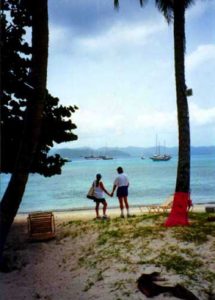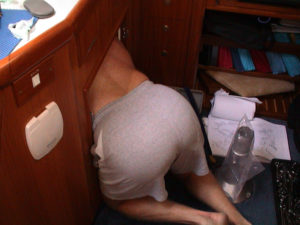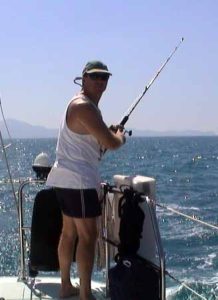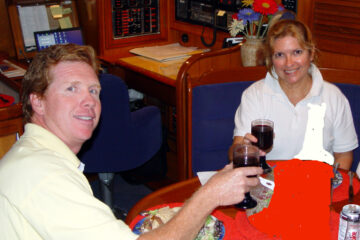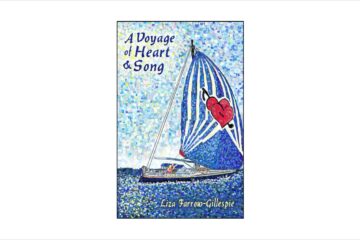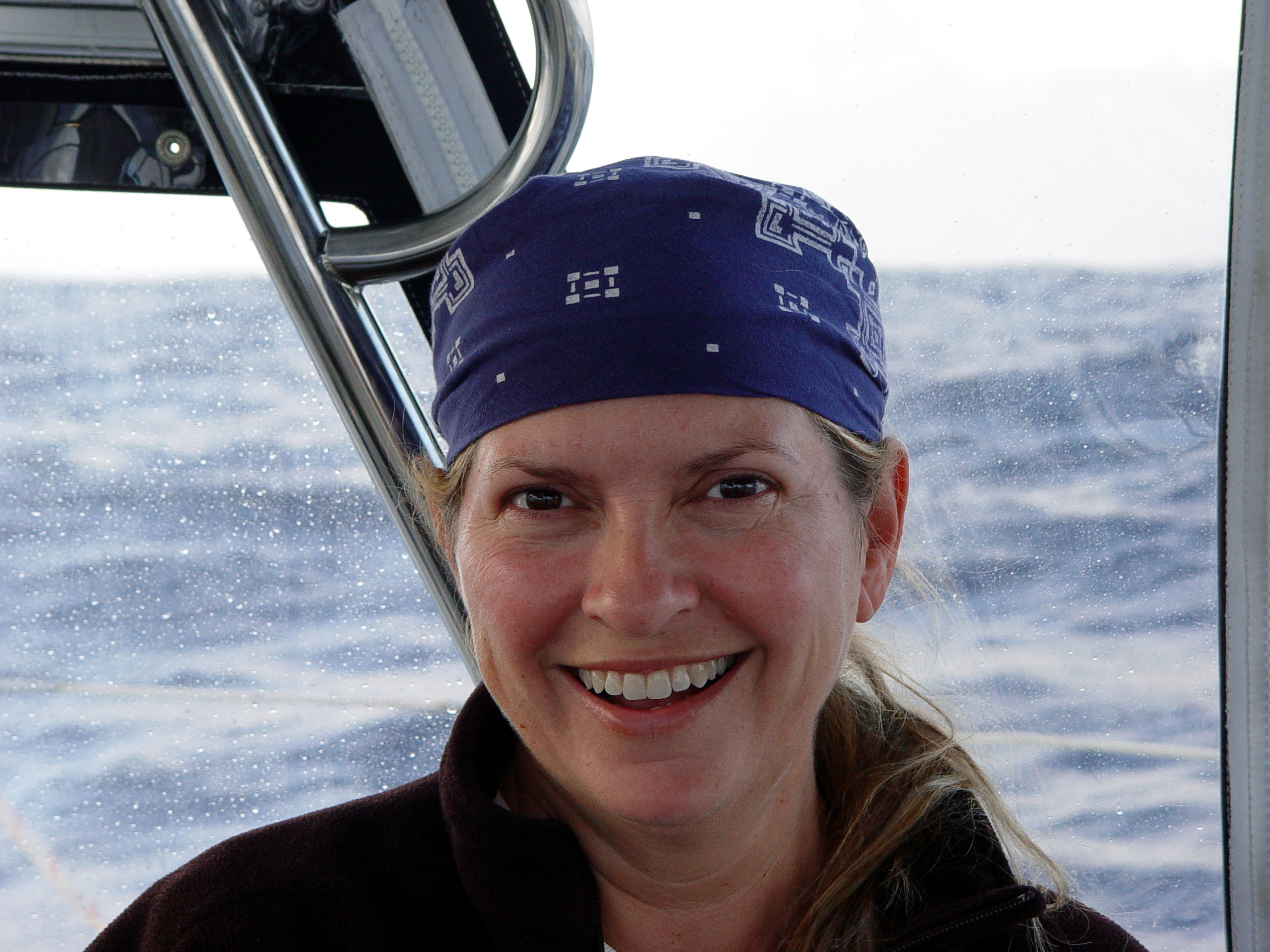Okay you lubbers — and you know who you are. Here are answers to questions we get all the time. (This page was written in Auckand, New Zealand, in 2000.)
1. What has been the scariest part so far on your trip?
Round-the-clock exposure to my husband’s sense of humor. Gales are nothing in comparison.

2. Where do you stop at night?
On an ocean passage, we sail through the night without stopping — at least not intentionally. When we are not on passage, though, we spend most nights at anchor in a sheltered bay.
3. On passages, don’t you worry about hitting one of those huge cargo ships while you’re asleep?
Yes. That’s why one of the two of us is awake and on watch at all times when the boat is underway.
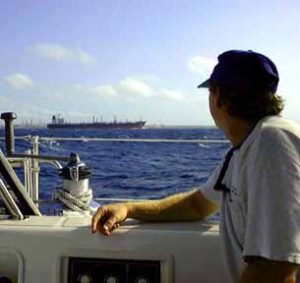
4. What kind of watch schedule do you keep?
Here is our usual watch schedule while on passage:
- Noon-1500 (Liza)
- 1500-1700 (Alan)
- 1700-1900 (Liza)
- 1900-0200 (Alan)
- 0200-0900 (Liza)
- 0900-noon (Alan)
We tried the traditional 4-hour watches. After I read some books on sleep deprivation, though, we went to 7-hour watches at night so we can each get more uninterrupted sleep. According to the books, people get significantly fatigued, physically and mentally, when they get less than 6 continuous hours of sleep (4 cycles of REM sleep) for periods of a week or more. And tired sailors make bad decisions. (Also, they’re cranky.)
The boat is rigged for short-handed sailing so that either one of us can handle it without having to wake the other except in an emergency.
By the way, we stand watch only when underway. In port we don’t keep watches at all, unless there’s a really bad storm, and/or we are concerned about the anchor dragging.
5. What do you do on watch?
While underway and on watch, I scan the horizon every 5 or 10 minutes for hazards. Check equipment. Futz with the sails. Make entries in the logbook. Plot our position on the chart. Make course changes if necessary. Talk to the auto-pilot. Eat. Read, or at night listen to books on tape. Watch for dolphins. Daydream. Enjoy the solitude.
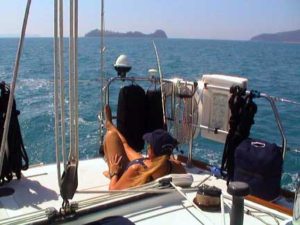
6. What do you do off watch on a passage?
While underway but not on watch, I do absolutely nothing. Alan watches videos and repairs all the stuff that breaks.
7. How do you know where you are?
We use a Global Positioning System (GPS) device, which electronically computes the boat’s latitude and longitude to within about three hundred feet. As back-up to the primary GPS, we have four spare GPSs — two handheld and two contained in other equipment. We also use dead reckoning and carry a sextant.
8. Do you ever use your sextant?
Nope. About the best I can say is that we still have our notes from the celestial navigation seminar.
9. What do you eat on board?
In an astounding revelation, I have recently acknowledged that all over the world, people obtain and eat food. You could not have convinced me of this, however, during my Sam’s Club provisioning frenzy before we left the States. That first year if we had lost the can opener, we would have starved.
Now, though, we shop at local markets and enjoy whatever we find, whether it’s callaloo, pamplemousse, or packages with cooking instructions in Dutch. In remote areas, we bake our own bread and shop directly at local fishing boats. In urban areas, we stock up on staples and canned goods for several months at a time.
10. Do you fish?
I like to fish, but I’m always afraid I’ll catch one. I think they sense that my heart really isn’t in it, and they stay away. We are going for the all-time record in the category of “Fewest Fish Caught on a Circumnavigation.” Plus, to be fair, we enjoy contributing to local economies by buying fish from local fishermen.
11. Do you ever see any other sailboats with people doing the same thing as you?
Absolutely. Many, many people from all over the world are out here voyaging. It is a sub-culture that I had no idea existed before I joined it.
Maybe it’s because we have the time, or maybe it’s because we understand how profoundly we rely on each other for safety at sea, but nobody is more neighborly than the typical voyager. The neighborhood itself is constantly changing, of course, and one need only weigh anchor to find complete solitude elsewhere. But oh the celebration on pulling into a remote bay and finding a favorite friend one last saw months ago on a different continent!
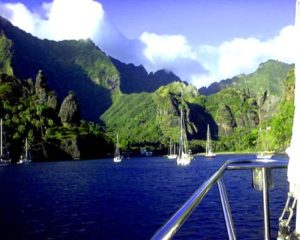
12. Do you meet local residents in the places you visit?
Yes, of course. One of my very, very favorite parts of this adventure so far is meeting folks and learning about their lives. We have made some good friends and learned a lot, particularly about perspective. In return, we share what we know. For example, Alan has done a lot of medical good in the more remote areas we have visited. Surprisingly, lawyers seem to be less in demand. 🙂
Music has been a big part of our interaction, as well.

13. What are the biggest adventures so far?
Going through the Panama Canal, crossing the Pacific Ocean, and finding spare parts for the generator in third-world countries.
14. Why do you carry around all that extra equipment to maintain — genset, refrigeration, watermaker, microwave, washer-dryer?
Sadly, in between sailing and exploring, one must cook, clean and do laundry.
The topic of how many creature comforts to carry on a cruising boat is one of heated debate amongst voyagers and in the sailing magazines. My response to minimalists is this: Either we spend time and energy maintaining and repairing mechanical conveniences, or we spend time and energy compensating for their absence.
For example, without the domestic mechanical conveniences listed above, a voyager in remote areas must haul fresh water by hand in jerry jugs from village to dinghy to boat (repeat ad infinitum); do laundry in buckets or by slapping it against rocks by the proverbial river; cook over a hot stove in the tropics instead of quickly nuking dinner; deal with skin problems from salt-water showering; do without perishable food or go to time-consuming lengths either to preserve it or to make it daily in small quantities from scratch; and on and on and on.
I did not go to sea to become a frontier housewife. Boat life is plenty rugged, adventurous and demanding all by itself. When our equipment malfunctions, we quite cheerfully perform the primitive domestic tasks itemized above. But if I had to do it on a daily basis for the entire five-year circumnavigation, I would not be a happy cruiser.
15. Does that one-unit washer/dryer work?
Yeah, it does. It washes the clothes and then dries them in the same space, without a vent to the outside. The manufacturer said that the smaller version doesn’t get the clothes completely dry, but the Combomatic 6000 works like a charm.
16. How do you avoid storms at sea?
You can’t, at least not entirely. All you can do is avoid hurricane season; be diligent about gathering and respecting weather information; pay attention to the sky; and hope for the best.
17. Have you ever been in a really bad storm underway?
We’ve been pretty lucky so far, knock wood. We’ve had some adrenaline-shot gales — 45-knot winds and 20-foot whitecaps in the Pacific. One thunderstorm on passage to the Galapagos was pretty scary. But Heartsong III has been up to the task, knock wood again. She has saved our lives over and over again.

18. What was it like to cross the Pacific?
It was amazing. It was one of the very best experiences of my life. I felt free and self-sufficient and at one with nature. If I die tomorrow, I will die happy because I did it.
But to put it in perspective, imagine driving in a Winnebago all the way from San Francisco to Miami — without ever stopping or getting out — bouncing over hilly, bumpy roads — in the rain — at about 10 miles per hour.
Landfall in the Marquesas Islands of French Polynesia was . . . incredibly exciting.
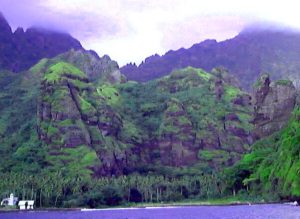
19. What has been your favorite place so far?
All of them. OK, if I had to choose it would be New Zealand — but that may just be the recency theory at work. (This page written in Auckland.)
20. What has been the most beautiful sight so far?
The night sky at sea. Not only the constellations, but whole other galaxies are visible with the naked eye. It makes me feel an odd combination of wholly insignificant . . . and yet crucial.
21. Living on a boat, what sorts of things do you worry about?
- Sinking
- Drowning
- Singing and drowing
- That our marine toilet will break
- Pirates
Pretty much in that order.
22. Are there still pirates out there?
(This page written in New Zealand, halfway through the circumnavigation.)
We haven’t seen any, knock wood, but we know of several confirmed attacks on our route — Venezuela, Indonesia, and the entrance to the Red Sea. We take normal safety precautions and in areas of known danger try to travel in company with other boats.
All things considered, we’re still probably a whole lot safer out here than we ever were on Central Expressway in Dallas.
Note added in late 2003: Since writing the above answer we have certainly seen some pirates, but I still maintain that freeway driving is a bigger threat.
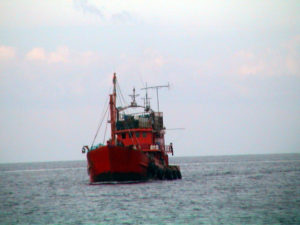
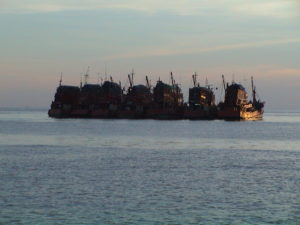
23. Have you seen any sharks?
Yes, often. Even more than in my old law practice. 🙂
24. Do you ever get lonely?
Nope. We miss our family and land-friends, but we stay in touch by e-mail. Plus, we have made many close friends among the cruising community. And after so many years of long working hours, Alan and I love having so much time alone together. In a living space the size of our former walk-in closet, loneliness is rarely an issue.
25. Being together constantly in such a small space, how do you and your husband avoid killing each other?
We do really well together. In fact, most of the married cruising couples I know are particularly close. What I don’t know is whether cruising brings a couple closer together, or whether a couple needs to start out extraordinarily close to survive the experience.
26. What in the world do you DO? With all your time, that is?
Apart from regular chores (which take a lot longer to accomplish when you live on a boat in mostly remote areas) and apart from trying to maintain the boat in like-new condition, I spend my time doing the things I always said I wished I had time to do — like read a lot, write a lot, spend time with Alan, learn how to do stuff (like web design and video editing), see the world, talk to people with lives wildly different to my own, and get enough sleep. Believe me, there’s rarely any time left over; and when there is, I sit around and do nothing at all.
27. Why on earth are you doing this?
Because it’s my dream. Because I love it. Because life can be so very short. Had I known that my mid-life crisis would be this much fun, I would have had it much earlier.
